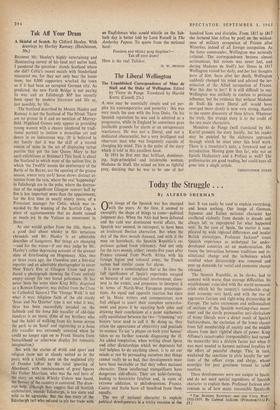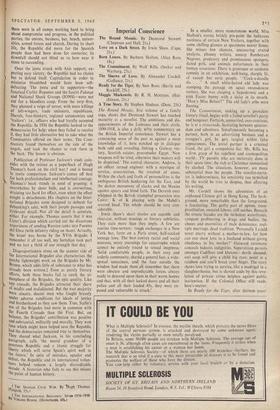Today the Struggle . . .
By ALFRED SHERMAN
(Nutt image of the Spanish war has changed kf with the years. At the time, it seemed to exemplify the shape of things to come—political judgment day. When the Axis had been defeated and the cold war dominated world affairs, the Spanish war seemed, in retrospect, to have been an irrelevant Iberian aberration. But when the day of the tiers monde dawned, and with it the man on horseback, the Spanish Republic's ex- perience gained fresh relevancy. And not only for the tiers monde, either; twenty-five years after Franco crossed from North Africa with his foreign legion and colonial army, the French nation had similar cause for alarm.
It is now a commonplace that at the time the full significance of Spain's experience escaped us because of our emotional involvement, close- ness to the events, and proneness to interpret it in terms of North-West European preoccupa- tions. An equal and opposite reaction has since set in. Many writers and commentators now feel obliged to assert their complete uninvolve- merit and prove it by equating both sides and drawing their conclusions at a point mathemati- cally equidistant between the two—`trimming,' my history tutor used to call it. By doing so, they attain the appearance of objectivity and preclude its essence. To say 'a plague on both your houses' takes us no further towards diagnosing the ill. An added temptation, when writing about Spain and other dictatorships which we deprecate but feel helpless to do anything about, is to set our minds at rest by persuading ourselves that things cannot really be so bad, that developments must have been inevitable or that they reflect national character. These intellectual tranquillisers have dangerous side-effects. They are habit-forming, leading to •historicist fatalism and, in cases of extreme addiction, to philodespotism. Franco, Castro and Stalin have all benefited from them equally.
The use of national character to explain' political developments is a tricky exercise at the
best. It can easily be used to explain everything, and hence nothing. Our image of German, Japanese and Italian national character has oscillated violently from decade to decade and always left us unprepared for what happened next. In the case of Spain, the matter is com- plicated by wide regional differences and insular British stereotypes. Professor Jackson* treats Spanish experience as archetypal for under- developed countries set on modernisation. He traces the interaction between traditions and in- stitutional change and the turbulence which resulted when dictatorship was removed and pent-up demands for social and economic change released.
The Spanish Republic, as he shows, had to contend with worse than average difficulties. Its establishment coincided with the world economic crisis which hit the country's ramshackle stag- nant economy very hard, and with the rise of aggressive fascism and right-wing dictatorihip in Europe. The naïve extremism and millennialism of .sections of the Spanish working-class move- ment and the sterile provocative anti-clericalism of many liberals were a direct result of Spain's backwardness, the exclusion of the lower classes from full membership of society and the middle classes from their rightful share of power. King Alfonso's catastrophic irresponsibility had turned the monarchy into a divisive factor just when it was most needed to harness national loyalties to' the effort of peaceful change. This, in turn, weakened the sanctions to civic loyalty for sec- tions of the officer , corps and clergy, whose' nostalgia for past greatness turned to rabid reaction.
These developments were not unique to Spain, and do not need special ingredients of Spanish character to explain them. Professor Jackson also reminds us of how many reasonable Spaniards
* THE SPANISH REPUBLIC AND THE CIVIL WAR:
1931-1939. By Gabriel• Jackson. (Princeton/O.U.F. £5.)
there were in all camps working hard to bring about compromise and progress, in the political Parties, the unions, business, bar, bench, univer- sities, armed forces and church. During its short life, the Republic did more for the Spanish People than had been done for centuries; its downfall should not blind us to how near it came to succeeding.
Once the junta struck with Axis support, ex- pecting easy victory, the Republic had no choice but to defend itself. Capitulation in order to minimise bloodshed would have been self- defeating. The junta and its supporters—the fanatical Carlist'Requetes and the fascist Falange and National Shock Groups (JONS)—were not out for a bloodless coup. From the very first, they planned a reign of terror, with mass killings of left-wingers, trade unionists, republicans, liberals, free-thinkers, regional autonomists and 'traitors': i.e., officers who had loyally accepted the Republic. In 1936 the Republic looked to the democracies for help; when they failed to receive it, they had little alternative but to take what the Communists offered on their terms. The Com- munists found themselves on the side of the angels, and took the chance to stab them in the back. The lesson is obvious.
Publication of Professor Jackson's study coin- cides with the reissue as a paperback of Hugh Thomas's book on the civil war,t and is bound to invite comparison. Jackson's comes off best for both professionalism and intellectual courage. Thomas's' book stands in need of pruning; it overwhelms by sheer bulk, and is overwritten, straining too hard for effect, even when the effect sought is detachment. His chapters on the Inter- national Brigades seem designed to debunk for debunking's sake, with their purple passages and irrelevant detail. Not all. the detail is accurate, either. For example, Thomas asserts that it was Lister's division which carried out the disastrous experiment of sending Russian tanks into Fuentes del Ebro (with infantry riding on them). Actually. the brunt was borne by the XVth Brigade; I remember it all too well, my battalion took part and we lost a third of our strength that day.
DisproPortionate stress on the seamier side of the International Brigades also characterises the Patchy lightweight work on the Brigades by Mr. Brome, which adds little of substance to what has already, been written.$ Even as purely literary efforts, both these books fail to catch the at- Mosphere.of the Brigades, the epic quality. Like any crusade, the Brigades attracted their share of misfits and maladjusted. But the vast majority were sincere, decent men who fought bravely under adverse conditions for ideals of justice and brotherhood as they saw them. True, Stalin's use of the Brigades had more in common with the Fourth Crusade than the First. But, on balance, the Brigades' contribution was positive and substantial, militarily and morally. They won time which might have helped save the Republic had the democracies remained true to themselves. They shared what Jackson, in his concluding Paragraph, calls 'the moral grandeur of a generous Republic and a titanic struggle for liberty which will serve Spain's spirit well in the future.' In spite of mistakes, squalor and defeat, the Republic and its international volun- teers helped redeem a largely discreditable decade. A historian who fails to see this misses the point of human history.
t THE SPANISH CIVIL WAR. By '!ugh Thomas. (Penguin, 15s.1 THE INTERNATIONAL BRIGADES: SPAIN 1936-1939. uY Vincent Brome. (Heinemann, 45s.)































 Previous page
Previous page